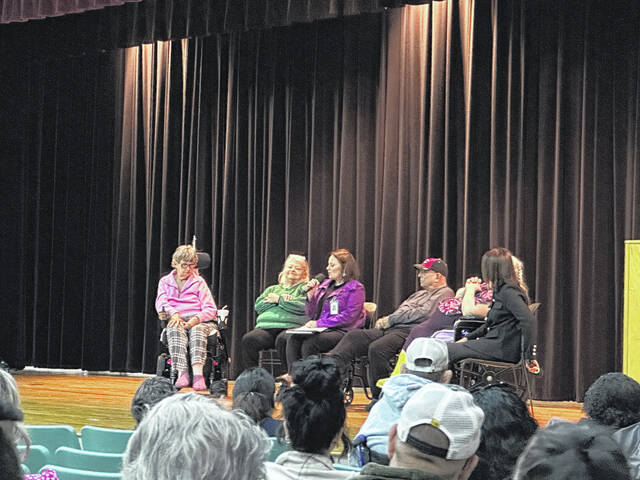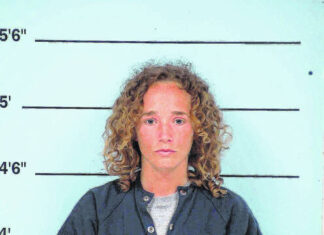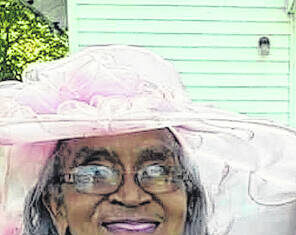
Residents speak with Amanda Grooms, District Long-Term Care Ombudsman for the Buffalo Trace Area Development District, at the annual Residents Forum.
Lauren Tatman/The Ledger Independent
On Friday, Oct. 24, the Buffalo Trace Area Agency on Aging and Independent Living welcomed individuals and long-term care residents to the Maysville Community and Technical College to recognize Residents’ Rights Month.
Amanda Grooms, District Long-Term Care Ombudsman for the Buffalo Trace Area Development District, began the event and stated that there is “something incredibly special” about the area.
“Though we may be the smallest district in the state, I firmly believe that we have the potential to make the biggest impact,” Grooms said. “Within our five counties, we are home to five nursing facilities and one assisted living community.”
In attendance were representatives from Maysville Nursing and Rehab Facility, Perkins Country Manor, Pioneer Trace, Robertson County Healthcare Facility, Vanceburg Hills and Kenton Pointe Assisted Living Community.
“Each of you, staff, administrators and caregivers work tirelessly to meet the individual needs of every resident every single day,” Grooms stated. “Thanks to dedicated volunteers who give so selflessly to ensure residents receive not only quality care, but quality of life.”
She explained that when the event began two years ago, its goal was to provide residents with the opportunity to tell their own stories and use their voices.
Brandon Wood, Regional Ombudsman with the State Homecare, expressed that the residents were the reason they were there and that the testimonies their voices dictated were powerful.
Victoria Elridge, Commissioner of the Department for Aging and Independent Living, was welcomed to the stage, where she stated that she had the honor of meeting the residents at the forum.
“Please know that Team Kentucky stands by each and every single one of you all and the 40,000 Kentuckians that call long-term care their home,” Elridge stated. “With that, Team Kentucky is honored to support the almost 300 nursing homes across the state, and we are really excited and invested in ensuring nursing home quality and transparency.”
She then presented a proclamation on behalf of Gov. Andy Beshear authorizing and proclaiming October as Residents’ Rights Month.
As a few residents were welcomed to the stage for a discussion, individuals gave comments regarding ongoing issues.
“Currently, in the Buffalo Trace District, there are no memory care facilities or memory care units. This means that individuals living with Alzheimer’s Disease and other forms of Dementia and their families have nowhere local to turn for specialized around-the-clock care. Memory care units are not simply nursing homes or assisted living facilities with a new name. They are specialized environments designed to provide safety, dignity and quality of life for individuals experiencing memory loss,” an individual stated.
They further noted that people have to travel long distances for appropriate care when services are not available.
“It affects the very fabric of our community when our elders, the people who built this place, that built Robertson, Fleming, Lewis, Bracken and Mason Counties, cannot receive the compassion and care they deserve close to home,” they continued. “Investing in memory care is an investment in our community’s values, compassion, dignity and respect for all stages of life. It means ensuring that no family must choose between quality care and proximity of their loved one.”
Another individual then addressed a proposed structural change to the Medicaid Program, stating that it is the “largest single payer of long-term care in the nation.” They further noted that 30,000 of around 1.4 million people reside in nursing homes.
“Congress is proposing to structurally change the Medicaid program by implementing stifling cuts, cost-cutting provisions, including reduced retroactive coverage, new long-term care eligibility restrictions and delays to enrollment system improvement are likely to affect nursing home residents,” they explained. “Less Medicaid money would likely mean less staff and fewer resources, and nursing homes putting residents at the increased risk of decline and injury.
“We must share with our legislators that two out of every three nursing home residents rely on this funding to have their needs met. There is far more reluctancy to apply for these services than people believe, and these residents are far more than statistics. They are not taking advantage of the system, but rather able to have their needs met and thrive because of it.”
Residents under the age of 65 were recognized, and it was expressed that “needing help does not have an age limit.”
“It’s so important that we, as a community, see them fully. They bring energy, perspective and resilience to our homes,” an attendee stated.
Another noted topic was the need for the preservation of mental health of staff in long-term care facilities.
“Staff are overworked, and those with the best intentions may not have the specific training to manage complex mental health issues. This is not criticism, but a call to action. We can and must do better,” one individual stated. “The facility that prioritizes mental health creates a more vibrant, engaged and fulfilled community for everyone. Enhanced mental health services can lead to improved quality of life, better physical outcomes, a stronger workforce.”
Attendees also advocated for the increase in the personal needs allowance that long-term care residents receive per month. It was stated that the allowance in Kentucky has not changed since 2021 and is set at $60.
After individuals spoke on the issues at hand, a few residents joined the stage for a discussion.
The first question asked residents what some misconceptions there were about people receiving Medicaid benefits.
One resident answered that not many people can live on the $60 allowance.
Grooms explained that the personal needs allowance is the money people are able to retain from their income. If you receive Medicaid benefits, the remainder of your income is put towards the cost of your care.
She then asked residents what some of their monthly expenses were that they pay out of their personal needs allowance. A resident gave an example of a laptop or anything they cannot get at the long-term care facility. Another resident stated that they receive $30 per month and they use it to pay for life insurance. Cell phones were also mentioned and one resident said that their allowance money would not cover one.
“I don’t think that everyone always realizes the limited amount of money that is left over, and for so many, that might also be your kind of last little bit of independence, because when we enter a long-term care facility, we give up so much before we even enter those doors,” Grooms stated.
One resident mentioned birthday cards and noted that it is difficult to give extra money to family members.
Grooms then began discussing the topic of residents under the age of 65 and expressed that care is individualized.
“How we approach a 32-year-old and provide their care often looks very different than someone much older,” she said.
She then emphasized the necessity of mental health services for seniors and asked the residents if they felt mental health gets the same attention that physical health does.
One resident explained that there are residents who are afraid to be alone and suggested drawing attention to helping neighbors or roommates.
“I think that anytime we extend a listening ear or a hug to another person, that does make all the difference,” Grooms stated. “But as you said, it does fall on fellow residents or staff to address the mental health needs of residents.”
She then mentioned a program offered through the Fleming County Hospital and used by nursing homes for those aged 65 and older.
“It was extremely beneficial, but with cuts to our rural hospital, Fleming County Hospital, that program was cut. And I don’t think that gets the attention that it deserves because that was definitely a loss to our area, and we had several residents that participated in that program, and I don’t feel that the services they now receive are fully meeting their needs,” Grooms said.
The residents were asked whether memory care units were in facilities in communities where they grew up, to which one responded that they grew up in Maysville but live at the Robertson County long-term care facility, which is close to a family member. Another resident stated that they are in Fleming County and were a stranger when they got there, and a third stated that they live in a long-term care facility where they grew up and are able to see friends and family.
“I feel like every time we meet and when we talk, we always kind of go back to the same things of home and family and connection, and that’s something that you’ll always share,” Grooms expressed.





